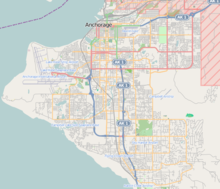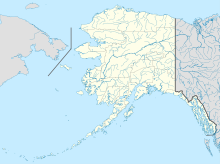| This article's lead section may be too short to adequately summarize the key points. Please consider expanding the lead to provide an accessible overview of all important aspects of the article. (September 2016) |
| Merrill Field | |||||||||||||||||||
|---|---|---|---|---|---|---|---|---|---|---|---|---|---|---|---|---|---|---|---|
 | |||||||||||||||||||
| Summary | |||||||||||||||||||
| Airport type | Public | ||||||||||||||||||
| Owner | Municipality of Anchorage | ||||||||||||||||||
| Location | Anchorage, Alaska | ||||||||||||||||||
| Elevation AMSL | 137 ft / 42 m | ||||||||||||||||||
| Coordinates | 61°12′49″N 149°50′40″W / 61.21361°N 149.84444°W / 61.21361; -149.84444 | ||||||||||||||||||
| Website | Merrill Field | ||||||||||||||||||
| Map | |||||||||||||||||||
  | |||||||||||||||||||
| Runways | |||||||||||||||||||
| |||||||||||||||||||
| Statistics (2015) | |||||||||||||||||||
| |||||||||||||||||||
| Source: Federal Aviation Administration | |||||||||||||||||||
Merrill Field (IATA: MRI, ICAO: PAMR, FAA LID: MRI) is a public-use general aviation airport located one mile (1.6 km) east of downtown Anchorage in the U.S. state of Alaska. The airport is owned by Municipality of Anchorage. It opened in 1930 as Anchorage Aviation Field and was renamed in honor of Alaska aviation pioneer Russel Merrill.
History

Merrill Field, located on the east end of 5th Avenue in Anchorage, was the first official airport in the city when it opened in 1930. It was Anchorage's only airport until 1951, when Ted Stevens Anchorage International Airport opened, along with the introduction of ever larger and faster commercial aircraft required that an airfield with longer and heavier runways be built.
Construction of the original 35-acre (14 ha) site one mile east of the city was completed on 22 Aug. 1929. Originally named Anchorage Aviation Field, it was later renamed Anchorage Municipal Airport. The airport is now named for Russel Merrill, an Alaskan aviation pioneer. An aerodrome beacon was located at Merrill Field and dedicated on 25 September 1932 in Merrill's honor.
The airfield remains in use today as the primary field for private wheel-equipped aircraft in the warmer months, and for ski-equipped aircraft in the winter. A section of the property used to be a municipal landfill.
Facilities and aircraft
Merrill Field covers 436 acres (176 ha, 1.76 km) and has three runways:
- Runway 5/23: 2,000 x 60 ft (610 x 18 m), surface: gravel/dirt
- Runway 7/25: 4,000 x 100 ft (1,219 x 30 m), surface: asphalt
- Runway 16/34: 2,640 x 75 ft (805 x 23 m), surface: asphalt
For the 12-month period ending September 30, 2013, the airport had 126,234 aircraft operations, all of which were general aviation. There are 844 aircraft based at this airport: 786 single engine, 41 multi-engine, 16 helicopters and one glider.
There are no based jets, although one retired Boeing 727 donated by FedEx is used as a training aid by the University of Alaska Anchorage's Aviation Technology Division, which is based at the airfield. It is not airworthy.
When it landed in February 2013, the Boeing 727 was the largest aircraft ever to have landed at Merrill Field. The landing required special permission from the city, and preparatory surveys of the runway and airfield infrastructure to ensure the aircraft could be landed safely; the captain practiced the landing in a flight simulator beforehand.
The airfield hosts two locally owned flight schools, air taxi services, and fixed-base operators. An extension of the Q Taxiway connects the airport to Alaska Regional Hospital for MEDEVAC operations.
A section of the airport is built over the closed Merrill Field Land Fill. This section requires slightly more maintenance due to settling and emissions.
Airline and destinations
Passenger
| Airlines | Destinations |
|---|---|
| Alaska Air Transit | Chenega, McGrath, Nikolai, Takotna, Tatitlek |
Statistics
| Rank | Airline | Passengers | Percent of market share |
|---|---|---|---|
| 1 | Alaska Air Transit | 2,090 | 90.68% |
| 2 | Spernak Airways | 220 | 9.32% |
| Rank | City | Airport | Passengers | Carriers |
|---|---|---|---|---|
| 1 | Nikolai, AK | Nikolai Airport | 550 | Alaska Air Transit |
| 2 | Tatitlek, AK | Tatitlek Airport | 300 | Alaska Air Transit |
| 3 | Chenega, AK | Chenega Bay Airport | 110 | Alaska Air Transit |
| 4 | Skwentna, AK | Skwentna Airport | 90 | |
| 5 | McGrath, AK | McGrath Airport | 40 | |
| 6 | Takotna, AK | Takotna Airport | 20 | Alaska Air Transit |
See also
References
- ^ FAA Airport Form 5010 for MRI PDF, effective January 5, 2017
- Great Circle Mapper: MRI / PAMR - Anchorage, Alaska (Merrill Field)
- Maclean, Robert Merrill; Rossiter, Sean (1994). Flying Cold. Fairbanks: Epicenter Press. pp. 155, 170–172. ISBN 9780945397335.
- ^ Anderson, Ben (26 February 2013). "Unusual 727 landing at Anchorage's Merrill Field draws a crowd". Alaska Dispatch News. Retrieved 2015-06-18.
- ^ "727 landing puts spotlight on UAA's aviation technology programs". Green & Gold News. University of Alaska Anchorage. 4 March 2013. Retrieved 2015-06-18.
- ^ Hopkins, Kyle (7 February 2013). "University wants Boeing 727 to land at Merrill Field". Alaska Dispatch News. Retrieved 2015-06-18.
- Erickson, Evan (12 March 2013). "The eagle has landed at Merrill Field: FedEx donates Boeing 727 to Aviation program". The Northern Light. Archived from the original on 18 June 2015. Retrieved 2015-06-18.
- https://www.regulations.gov/document/DOT-OST-2017-0108-0163
- "Alaska Air Transit schedule". Retrieved Sep 12, 2022.
- ^ "Merrill Field (MRI) Stats". Bureau of Transportation Statistics (BTS), Research and Innovative Technology Administration (RITA), U.S. Department of Transportation. August 2022. Retrieved December 2, 2022.
External links
- Municipality of Anchorage: Merrill Field (official website)
- FAA Airport Diagram for Merrill Field (MRI) (PDF), effective December 26, 2024
- FAA Terminal Procedures for Merrill Field (MRI), effective December 26, 2024
- Resources for this airport:
- FAA airport information for MRI
- AirNav airport information for PAMR
- ASN accident history for MRI
- FlightAware airport information and live flight tracker
- NOAA/NWS latest weather observations for PAMR
- SkyVector aeronautical chart for MRI